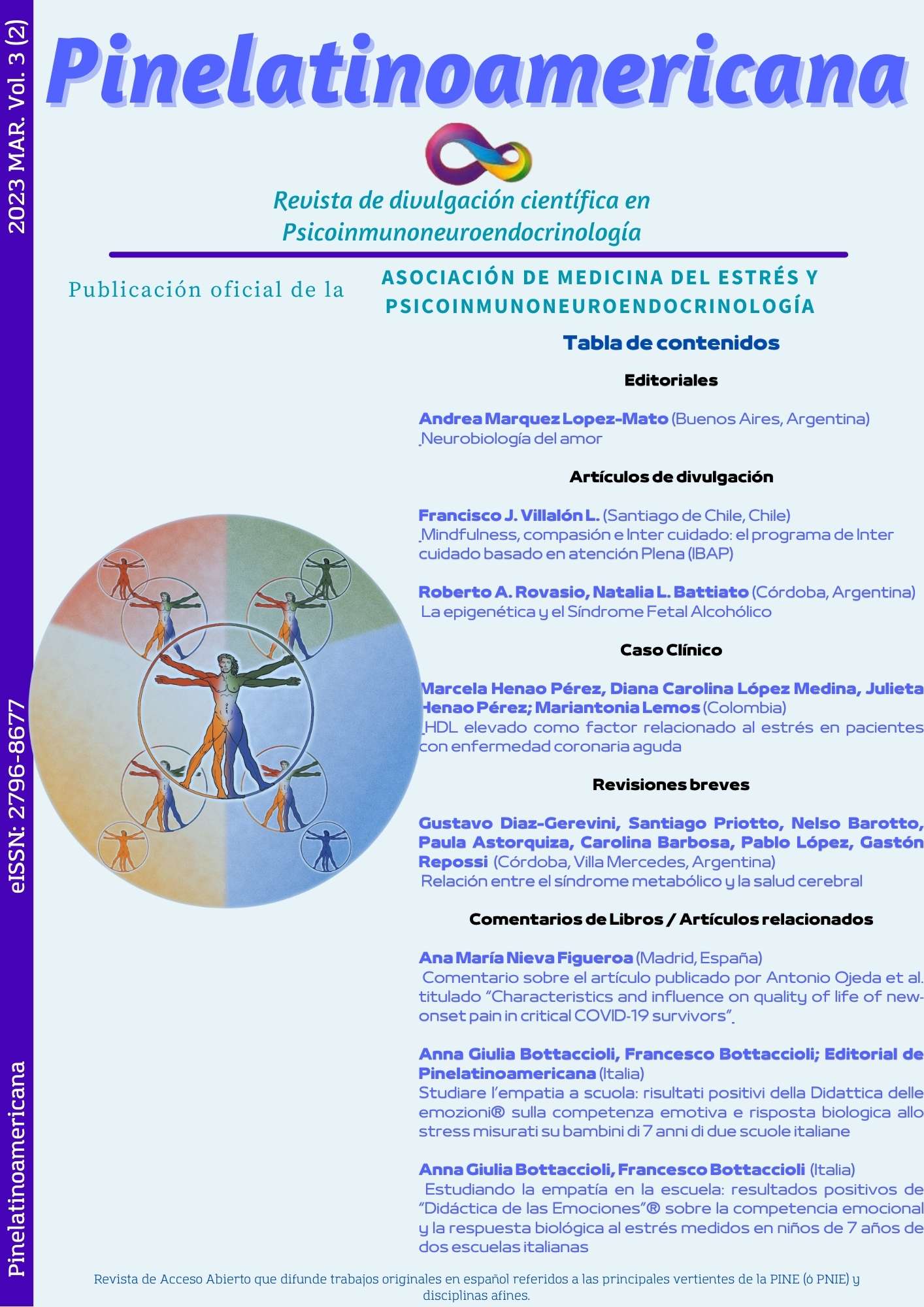Resumen
La práctica de atención plena y compasión ha demostrado ser efectiva tanto en bienestar emocional y mental, así como en el manejo de diversas afecciones psicológicas y físicas. Sin embargo, su difusión ha llevado a críticas y controversias relacionadas con la falta de uniformidad en la implementación de la práctica, las competencias mínimas necesarias y la instrumentalización de su componente ético/espiritual. Además, se ha observado que los factores comunes, como la alianza terapéutica y la pertenencia del grupo, podrían ser más importantes en la efectividad de la intervención. También se destaca la necesidad de programas adaptados culturalmente y más accesibles. Para abordar estas dificultades, se ha desarrollado el programa de Inter cuidado basado en atención plena y compasión (IBAP), que incluye la integración del componente ético/espiritual y el fomento de la pertenencia del grupo. El programa es modular, adaptable a diferentes poblaciones y está disponible para Latinoamérica. El mismo ha demostrado beneficios en el bienestar emocional y mental en estudios controlados aleatorizados. En conjunto, estas propuestas buscan fomentar la práctica de atención plena y compasión de manera más efectiva y accesible, teniendo en cuenta la diversidad cultural y las necesidades de cada comunidad.
Referencias
Allen, K.-A., Kern, M. L., Rozek, C. S., McInerney, D. M., y Slavich, G. M. (2021). Belonging: A review of conceptual issues, an integrative framework, and directions for future research. Australian Journal of Psychology, 73(1), 87-102. https://doi.org/10.1080/00049530.2021.1883409
Captari, L. E., Hook, J. N., Hoyt, W., Davis, D. E., McElroy-Heltzel, S. E., y Worthington, E. L. (2018). Integrating clients’ religion and spirituality within psychotherapy: A comprehensive meta-analysis. Journal of Clinical Psychology, 74(11), 1938-1951. https://doi.org/10.1002/jclp.22681
Dunning, D., Ahmed, S., Foulkes, L., Griffin, C., Griffiths, K., Leung, J. T., Parker, J., Piera Pi-Sunyer, B., Sakhardande, A., Bennett, M., Haag, C., Montero-Marin, J., Packman, D., Vainre, M., Watson, P., MYRIAD Team, Kuyken, W., Williams, J. M. G., Ukoumunne, O. C., Blakemore, S. J., … MYRIAD Team Group (2022). The impact of mindfulness training in early adolescence on affective executive control, and on later mental health during the COVID-19 pandemic: a randomised controlled trial. Evidence-based mental health, 25(3), 110–116. Advance online publication. https://doi.org/10.1136/ebmental-2022-300460
Gillath, O., Karantzas, G. C., Romano, D., y Karantzas, K. M. (2022). Attachment Security Priming: A Meta-Analysis. Personality and social psychology review: an official journal of the Society for Personality and Social Psychology, Inc, 26(3), 183–241. https://doi.org/10.1177/10888683211054592
Goldberg S. B. (2022). A common factors perspective on mindfulness-based interventions. Nature reviews psychology, 1(10), 605–619. https://doi.org/10.1038/s44159-022-00090-8
Hathaway, W. L., y Ripley, J. S. (2009). Ethical concerns around spirituality and religion in clinical practice. In J. D. Aten & M. M. Leach (Eds.), Spirituality and the therapeutic process: A comprehensive resource from intake to termination (pp. 25–52). American Psychological Association. https://doi.org/10.1037/11853-002
Krägeloh, C. U. (2016). Importance of Morality in Mindfulness Practice. Counseling and Values, 61(1), 97-110. https://doi.org/10.1002/cvj.12028
Luberto, C. M., Shinday, N., Song, R., Philpotts, L. L., Park, E. R., Fricchione, G. L., y Yeh, G. Y. (2018). A Systematic Review and Meta-analysis of the Effects of Meditation on Empathy, Compassion, and Prosocial Behaviors. Mindfulness, 9(3), 708–724. https://doi.org/10.1007/s12671-017-0841-8
Matko, K., Sedlmeier, P., y Bringmann, H. C. (2022). Embodied Cognition in Meditation, Yoga, and Ethics-An Experimental Single-Case Study on the Differential Effects of Four Mind-Body Treatments. International journal of environmental research and public health, 19(18), 11734. https://doi.org/10.3390/ijerph191811734
Mortari, L. (2019). Filosofia del Cuidado (1ra ed.). Editorial Universidad del Desarrollo.
Pargament, K. I., Exline, J. J., y Jones, J. W. (2013). APA handbook of psychology, religion, and spirituality (Vol 1): Context, theory, and research (pp. xxvii, 740). American Psychological Association. https://doi.org/10.1037/14045-000
Patterson, C. H. (2004). Do We Need Multicultural Counseling Competencies? Journal of Mental Health Counseling, 26(1), 67-73. https://doi.org/10.17744/mehc.26.1.j7x0nguc7hjh545u
Priebe, S., Conneely, M., McCabe, R., y Bird, V. (2019). What can clinicians do to improve outcomes across psychiatric treatments: a conceptual review of non-specific components. Epidemiology and psychiatric sciences, 29, e48. https://doi.org/10.1017/S2045796019000428
Schumer, M. C., Lindsay, E. K., y Creswell, J. D. (2018). Brief mindfulness training for negative affectivity: A systematic review and meta-analysis. Journal of consulting and clinical psychology, 86(7), 569–583. https://doi.org/10.1037/ccp0000324
Van Dam, N. T., van Vugt, M. K., Vago, D. R., Schmalzl, L., Saron, C. D., Olendzki, A., Meissner, T., Lazar, S. W., Kerr, C. E., Gorchov, J., Fox, K. C. R., Field, B. A., Britton, W. B., Brefczynski-Lewis, J. A., y Meyer, D. E. (2018). Mind the Hype: A Critical Evaluation and Prescriptive Agenda for Research on Mindfulness and Meditation. Perspectives on Psychological Science, 13(1), 36-61. https://doi.org/10.1177/1745691617709589
Villalón, L. F. J., Correa, M. E. y Cabieses, B. (2020). Intervención basada en mindfulness y pintura para cuidadores de niños y adolescentes con necesidades especiales: Un estudio piloto. Revista Archivos en Medicina Familiar, 22(2):61-71. https://www.medigraphic.com/cgi-bin/new/resumen.cgi?IDARTICULO=90975
Villalón L. F. J. (2023). Mindfulness, compasión e intercuidado: su marco conceptual. Pinelatinoamericana, 3(1), 42–53. https://revistas.unc.edu.ar/index.php/pinelatam/article/view/40756
Villalón, F. y Moreno, I. (2021, agosto 29). Curricular, Mindfulness, psychoeducational interventions for Mental Health and wellbeing in medical students during COVID-19 pandemic: Preliminary Results. AMEE Conference.
Villalón, F., Serrano, P., Rocuant, A., y Bertoglio, V. (2022, noviembre 10). Intervención online de inter-cuidado basada en mindfulness para reducir burnout en médicos durante la pandemia por COVID19: Resultados preliminares de un estudio clínico randomizado. LXXVII Congreso Sociedad Chilena de Neurología Psiquiatría y Neurocirugía, Chile.
Villalón F. J., Moreno M. I., Rivera, R., Venegas, W., Arancibia J. V., Soto A, y Pemjean, A. (2023). Brief online mindfulness and compassion based inter-care program for students during COVID19 pandemic: A randomized controlled trial. Mindfulness, [en prensa].
Zacca-González, G., Chinchilla-Rodríguez, Z., Vargas-Quesada, B., y de Moya-Anegón, F. (2014). Bibliometric analysis of regional Latin America's scientific output in Public Health through SCImago Journal & Country Rank. BMC public health, 14, 632. https://doi.org/10.1186/1471-2458-14-632

Esta obra está bajo una licencia internacional Creative Commons Atribución-NoComercial 4.0.
Derechos de autor 2023 Pinelatinoamericana

